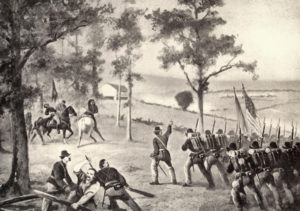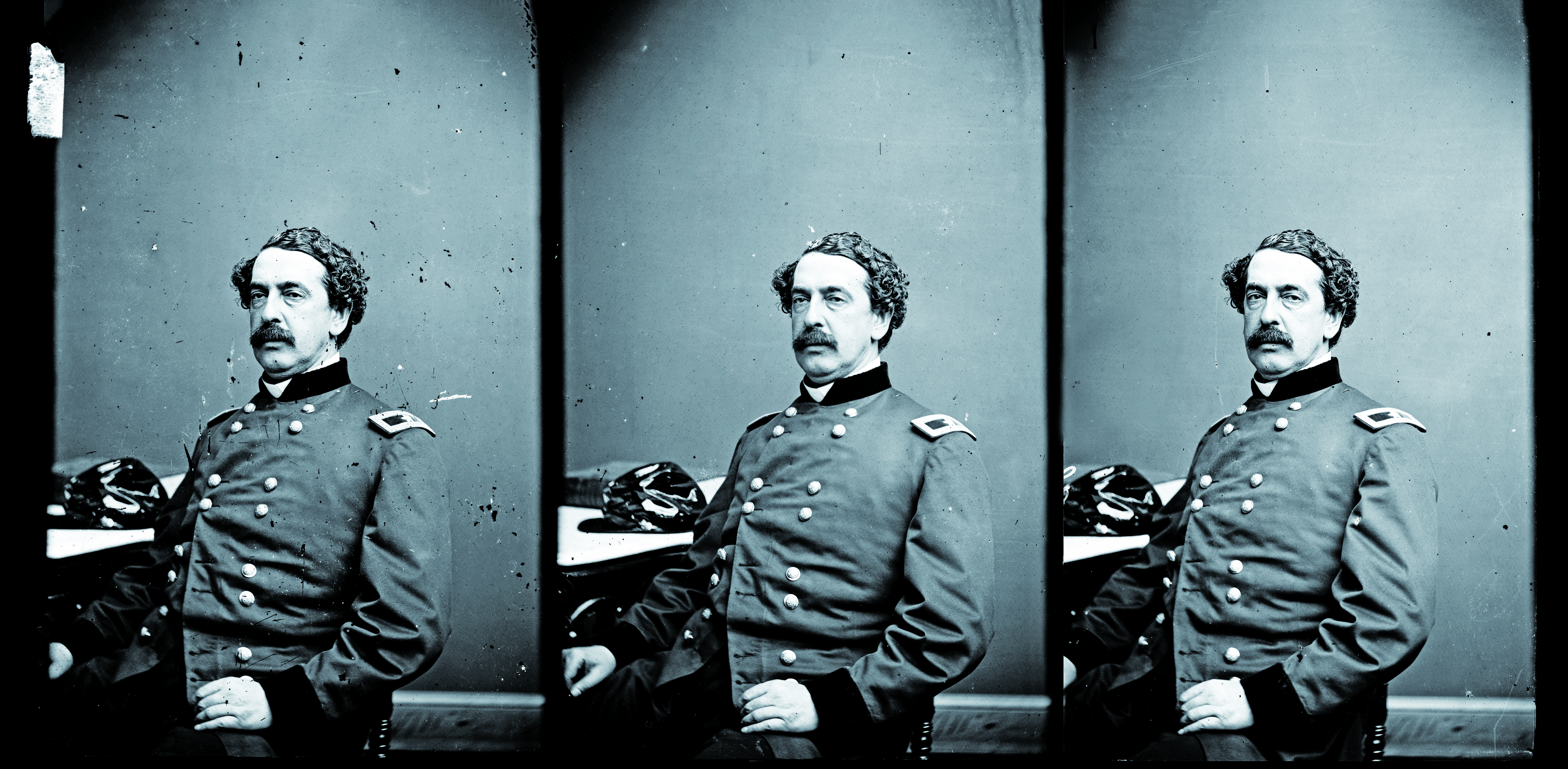Years after the climactic Pennsylvania battle, Doubleday continued to defend his actions and denigrate his superiors
The Battle of Gettysburg stood supreme in its ability to spark postwar controversies among officers in both the Confederate and Union high commands. Infighting among former generals of the Army of Northern Virginia has garnered the most attention from historians, resulting in a sizable literature that features James Longstreet playing villain to Jubal A. Early and other Lost Cause warriors who sought to absolve Robert E. Lee of all responsibility for defeat. J.E.B. Stuart, Richard S. Ewell, and A.P. Hill held supporting roles in these long-running debates that filled many pages in the Southern Historical Society Papers, personal memoirs, and other publications.
On the United States side, Maj. Gen. Daniel E. Sickles’ decision on July 2 to abandon his position on Cemetery Ridge and occupy a line stretching from the Klingel Farm along the Emmitsburg Road to Devil’s Den generated the most acrimony. Congress helped fuel the fires among Union generals because the Joint Committee on the Conduct of the War solicited and published testimony from many of the key actors.
Few officers on either side nursed a deeper sense of grievance than Maj. Gen. Abner Doubleday. New York-born and a graduate of West Point in 1842, he fought as an artillerist during the war with Mexico. During the secession crisis, he served under Major Robert Anderson as a captain in the 1st U.S. Artillery stationed at Fort Sumter. He commanded the 2nd Division in Maj. Gen. John F. Reynolds’ 1st Corps at Fredericksburg and, in the spring of 1863, took charge of the 3rd Division in that corps and led it at Chancellorsville (his troops played insignificant roles in both battles). Still head of the 3rd Division on July 1 at Gettysburg, he assumed corps command after Reynolds’ wounding and led it for the rest of the day.
That evening, based largely on 11th Corps commander Maj. Gen. Oliver Otis Howard’s reporting to Winfield Scott Hancock that “Doubleday’s command gave way” during the chaotic late- afternoon fighting, army commander George G. Meade placed the 1st Corps under John Newton. Seething at what he considered unfair treatment (Newton was junior to him in rank), Doubleday returned to the 3rd Division for the rest of the battle but soon left the Army of the Potomac. He never held another field command during the war, spending much of his time on courts-martial in Washington, D.C.
Howard and Meade had incurred the New Yorker’s enduring wrath, a fact made evident in Doubleday’s Chancellorsville and Gettysburg. Written as part of Scribner’s “Campaigns of the Civil War” series and published in 1882, the book bristled with criticism of the pair. Especially upset with Howard’s unfair insinuation that the 1st Corps collapsed prior to the retreat of the 11th Corps on July 1, Doubleday observed: “General Howard hastened to send a special messenger to General Meade with the baleful intelligence that the 1st Corps had fled from the field at the first contact with the enemy….[T]his astounding news created the greatest feeling against the corps, who were loudly cursed for their supposed lack of spirit and patriotism.” Doubleday also averred that Reynolds, rather than Howard, deserved credit for selecting Cemetery Hill as a position of great strength.

As for Meade, Doubleday portrayed him as timid and eager to abandon the field after the second day’s action. “At night a council of war was held,” he wrote with clear malice, “in which it was unanimously voted to stay and fight it out. Meade was displeased with the result, and although he acquiesced in the decision, he said angrily, ‘Have it your own way, gentlemen, but Gettysburg is no place to fight a battle in.’”
The army’s new chief, added Doubleday, had been rattled by the fierce Confederate attacks on July 2 and “thought it better to retreat with what he had, than run the risk of losing all.” Doubleday buttressed his version of events with a long footnote that acknowledged a “public discussion” about Meade’s intentions on the night of the 2nd. “There is no question in my mind,” he reiterated in the note, “that, at the council referred to, General Meade did desire to retreat….” The aftermath of Pickett’s Charge, Doubleday suggested, similarly showed Meade’s indecisiveness. At the critical moment at Waterloo, the Duke of Wellington had ordered, “Up, guards, and at them!” In contrast, “General Meade had made no arrangements to give a return thrust.”
Howard surely knew about Doubleday’s vituperative comments but chose not to respond in his own memoirs. Published in two thick volumes in 1907 as Autobiography of Oliver Otis Howard, Major General United States Army, they mentioned Doubleday’s actions at Gettysburg in purely descriptive passages. After chronicling hard pressure on both the 1st and 11th Corps after 3:30 p.m. on July 1, Howard stated simply that with firing “growing worse and worse” he determined that the “front lines could not hold out much longer.” “I will not attempt to describe the action further…,” he continued. “The order I sent to Doubleday then was this: ‘If you cannot hold out longer, you must fall back to the cemetery and take position on the left of the Baltimore Pike.’”
Meade reacted with more emotion. Doubleday’s testimony before the Joint Committee, which anticipated criticisms he leveled in Chancellorsville and Gettysburg, spurred Meade to complain to his wife in early March 1864 about “the explosion of the conspiracy to have me relieved…in which the Committee on the Conduct of the War, with Generals Doubleday and Sickles, are the agents.” The two-volume edition of Meade’s letters, published in 1913, included as an appendix a newspaper article by Sickles printed in The New York Times on April 1, 1883, that detailed Meade’s “Proposed Retreat on the Night of the 2nd of July.” Another appendix offered a stinging reply to Doubleday’s version of events, pronouncing General Meade’s actions “utterly inconsistent…with any such intention as that ascribed to him by General Doubleday.”
Impartial observers can find admirable and self-interested behavior and statements from Doubleday, Meade, and Howard regarding Gettysburg. Modern visitors to the battlefield will find statues to all three men that face resolutely toward the enemy.





